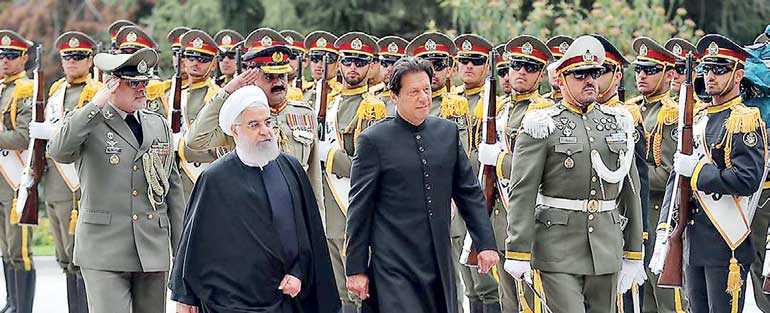Sunday Feb 15, 2026
Sunday Feb 15, 2026
Tuesday, 23 April 2019 00:00 - - {{hitsCtrl.values.hits}}

Iranian President Hassan Rohani (left) and Pakistani Prime Minister Imran Khan reviewing an honor guard in Tehran on April 22
TEHRAN, AFP: Iran and Pakistan have agreed to set up a joint border ‘reaction force’ following a number of deadly attacks by militant groups on their frontier, Iranian President Hassan Rouhani announced yesterday after talks with visiting Pakistani Prime Minister Imran Khan.
“We agreed to create a joint rapid reaction force at the borders for combatting terrorism,” Rouhani told a joint news conference, following months of increased tensions over attacks on both sides of the frontier.
The border skirts the volatile south eastern Iranian province of Sistan-Baluchistan which has been the scene of frequent attacks on Iran’s security forces.
Khan’s visit to Iran, the first since he took office last year, comes after gunmen, who Islamabad says were based in Iran, killed 14 members of Pakistan’s security forces last week in its own Baluchistan province.
“The security chief will sit down with his counterpart here and discuss (security) cooperation,” Khan said, although no details were given on the joint force.
“We trust that both countries will not have terrorist activities from their soil... We will not allow any damage to your country from our soil,” said the Pakistani premier who started a two-day visit on Sunday.
In March, Rouhani demanded Pakistan act “decisively against anti-Iranian terrorists”, following a 13 February attack that killed 27 members of the elite Revolutionary Guards in Sistan-Baluchistan.
Iran has said a Pakistani suicide bomber was behind the attack, claimed by the Sunni jihadist group Jaish al-Adl (Army of Justice), which Tehran says operates mostly out of bases in Pakistan.
On Saturday, Islamabad said it had evidence the “terrorist outfits” that carried out the attack in Baluchistan had “training and logistic camps inside Iranian areas bordering Pakistan”.
Islamist as well as ethnic Baluch separatists operate in Baluchistan, Pakistan’s poorest province.
Stressing that “no third country” could harm Iran-Pakistan ties, an apparent reference to the US and its policy of isolating the Islamic republic, Rouhani said Tehran was ready to boost trade and business ties with Islamabad.
“In the current situation the region’s countries must decide and plan for their interests independently and directly,” Rouhani said.
“Iran is ready to meet Pakistan’s oil and gas demands... (and) we are ready to increase (electricity) exports to Pakistan 10-fold,” he added.
He said cooperation between Chabahar port in southeast Iran and Pakistan’s Gwadar port can be increased, and that Tehran could facilitate the construction of a railroad connecting Istanbul to Islamabad.
Chabahar, only about 100 km (62 miles) from the Pakistan border and located on the Indian Ocean, is Iran’s largest port outside the Gulf and the only one exempt from US sanctions.
That is due mainly to the pivotal role of the port, and a planned railway line, in breaking landlocked Afghanistan’s dependence on Pakistan for trade with the world, especially with Pakistan’s rival India.
For his part, Khan said his visit to Tehran – the first by a Pakistani premier since Nawaz Sharif in 2016 – aimed to “find ways to increase trade and cooperation... in energy and other areas”, noting that two-way trade was “very limited”.
But he made no pledge on energy purchases or provide details on other economic links.
Pakistan is a close ally of the US and Saudi Arabia, both of which have ratcheted up pressure on Iran over its alleged meddling in regional affairs.
Washington last year pulled out of the 2015 Iran nuclear deal signed by Tehran and world powers and re-imposed harsh economic sanctions on the Islamic republic as part of a “maximum pressure” campaign.
Saudi Arabia and a number of its Arab allies cut diplomatic ties with Tehran in 2016 after protestors burned Saudi diplomatic mission in Iran in reaction to the kingdom executing Shiite cleric Nimr al-Nimr.